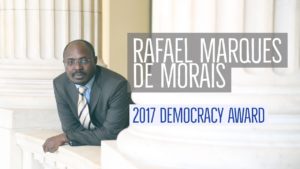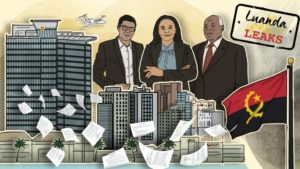A trove of more than 700,000 documents obtained by the International Consortium of Investigative Journalists, and shared with The New York Times, shows how a global network of consultants, lawyers, bankers and accountants helped Isabel dos Santos, Africa’s richest woman and the daughter of former Angolan president José Eduardo dos Santos, amass that fortune and park it abroad. Some of the world’s leading professional service firms — including the Boston Consulting Group, McKinsey & Company and PwC — facilitated her efforts to profit from her country’s wealth while lending their legitimacy, The New York Times reports:

Luanda Leaks/ICIJ
The documents, called the Luanda Leaks after the Angolan capital, include emails, slide presentations, invoices and contracts. They came to the I.C.I.J. through the Platform to Protect Whistleblowers in Africa, a Paris-based advocacy and legal group…..
When the Western advisory firms came into Angola almost two decades ago, they were viewed by the global financial community as a force for good: bringing professionalism and higher standards to a former Portuguese colony ravaged by years of civil war. But ultimately they took the money and did what their clients asked, said Ricardo Soares de Oliveira, an international politics professor at Oxford who studies Angola.
“They are there as all-purpose providers of whatever these elites are trying to do,” he said. “They have no moral status — they are what you make of them.”
 In September 2013, dos Santos’ reputation took a big public hit, the I.C.I.J. reports. In an article written by Kerry A. Dolan, a staff writer, and Rafael Marques (left),* a journalist and activist, Forbes magazine reported that dos Santos had exploited her status as Angola’s first daughter on her way to amassing a fortune that the magazine then put at $3 billion.
In September 2013, dos Santos’ reputation took a big public hit, the I.C.I.J. reports. In an article written by Kerry A. Dolan, a staff writer, and Rafael Marques (left),* a journalist and activist, Forbes magazine reported that dos Santos had exploited her status as Angola’s first daughter on her way to amassing a fortune that the magazine then put at $3 billion.
“As best as we can trace,” the story said, “every major Angolan investment held by Dos Santos stems either from taking a chunk of a company that wants to do business in the country or from a stroke of the president’s pen that cut her into the action.”
Marques dismissed dos Santos’ suggestion that she would consider running for president in the next election in 2022 as a ploy to divert attention from the “plundering of the country”.
 “There are some who want to take refuge under a political cloak to say they are being persecuted for political reasons,” he told AFP.
“There are some who want to take refuge under a political cloak to say they are being persecuted for political reasons,” he told AFP.
Facing a struggling economy and fast-approaching elections, President João Lourenço is working to combat rampant corruption in the country, notes Austin Doctor (@austincdoctor), an assistant professor in the department of government at Eastern Kentucky University. But without other more definitive and costly efforts to root out corruption, the judicial actions against the dos Santos family may appear to be for show rather than signs of structural change in Angolan politics, he writes for The Washington Post’s Monkey Cage.
 ICIJ’s visual explainer – From Colonization to Kleptocracy: A history of Angola – shows how Africa’s richest woman rose amid a country divided by war and rich in natural resources.
ICIJ’s visual explainer – From Colonization to Kleptocracy: A history of Angola – shows how Africa’s richest woman rose amid a country divided by war and rich in natural resources.
*Head of National Endowment for Democracy (NED) partner Maka Angola.







